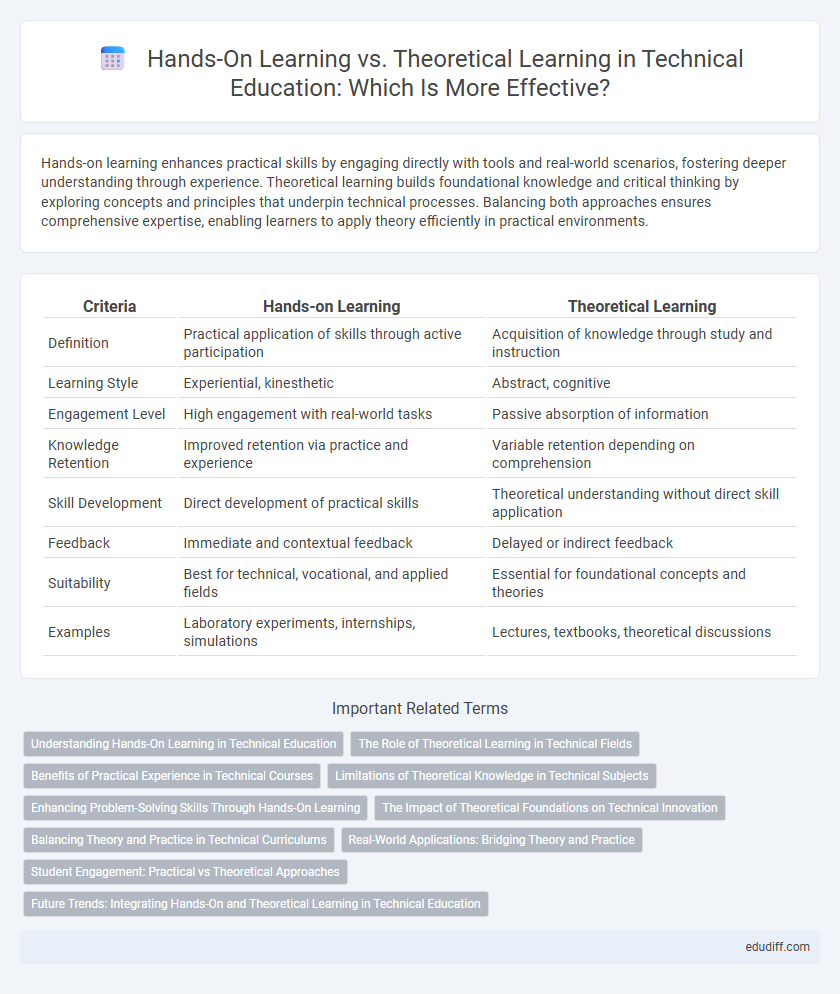Hands-on learning enhances practical skills by engaging directly with tools and real-world scenarios, fostering deeper understanding through experience. Theoretical learning builds foundational knowledge and critical thinking by exploring concepts and principles that underpin technical processes. Balancing both approaches ensures comprehensive expertise, enabling learners to apply theory efficiently in practical environments.
Table of Comparison
| Criteria | Hands-on Learning | Theoretical Learning |
|---|---|---|
| Definition | Practical application of skills through active participation | Acquisition of knowledge through study and instruction |
| Learning Style | Experiential, kinesthetic | Abstract, cognitive |
| Engagement Level | High engagement with real-world tasks | Passive absorption of information |
| Knowledge Retention | Improved retention via practice and experience | Variable retention depending on comprehension |
| Skill Development | Direct development of practical skills | Theoretical understanding without direct skill application |
| Feedback | Immediate and contextual feedback | Delayed or indirect feedback |
| Suitability | Best for technical, vocational, and applied fields | Essential for foundational concepts and theories |
| Examples | Laboratory experiments, internships, simulations | Lectures, textbooks, theoretical discussions |
Understanding Hands-On Learning in Technical Education
Hands-on learning in technical education emphasizes practical application of skills through real-world tasks, enabling students to develop problem-solving abilities and adapt to technological challenges. This experiential approach fosters deeper comprehension and retention by engaging learners directly with tools, equipment, and scenarios relevant to their field. Integrating hands-on practice accelerates mastery of technical concepts beyond theoretical knowledge, preparing students for workforce demands with tangible experience.
The Role of Theoretical Learning in Technical Fields
Theoretical learning provides a foundational framework critical for understanding complex technical concepts and principles, enabling professionals to analyze and predict system behaviors. It facilitates the development of problem-solving skills by offering models and abstractions essential for innovation in fields such as engineering, computer science, and information technology. Mastery of theoretical knowledge supports effective hands-on application and adaptation to emerging technologies in fast-evolving technical environments.
Benefits of Practical Experience in Technical Courses
Hands-on learning in technical courses enhances skill acquisition by allowing students to directly apply theoretical knowledge through real-world projects and simulations. Practical experience improves problem-solving abilities and technical proficiency, fostering deeper understanding of complex concepts compared to purely theoretical study. Industry-aligned labs and internships further prepare students for workforce demands, increasing employability and adaptability in fast-evolving technical fields.
Limitations of Theoretical Knowledge in Technical Subjects
Theoretical knowledge in technical subjects often lacks practical application, leading to gaps in problem-solving skills and real-world adaptability. Without hands-on experience, learners may struggle to understand complex systems or troubleshoot unexpected issues effectively. Reliance solely on theoretical concepts can hinder the development of critical thinking and technical proficiency required in dynamic work environments.
Enhancing Problem-Solving Skills Through Hands-On Learning
Hands-on learning significantly enhances problem-solving skills by engaging learners in real-world scenarios that require active experimentation and critical thinking. This approach allows for immediate application of theoretical concepts, fostering deeper understanding and retention of knowledge. Practical experience develops adaptability and innovative problem-solving strategies that theoretical learning alone cannot provide.
The Impact of Theoretical Foundations on Technical Innovation
Theoretical learning provides a critical framework for understanding complex technical principles, driving innovation by enabling the development of novel algorithms and system architectures. Solid theoretical foundations in fields such as computer science, engineering, and mathematics facilitate the prediction and optimization of technological solutions before prototyping. This foundational knowledge accelerates innovation cycles by reducing trial-and-error in hands-on experimentation and guiding practical implementations with scientific rigor.
Balancing Theory and Practice in Technical Curriculums
Effective technical curriculums integrate hands-on learning with theoretical foundations to enhance skill acquisition and problem-solving abilities. Practical exercises using real-world tools complement conceptual frameworks, enabling students to apply knowledge in dynamic environments. Balancing theory and practice ensures mastery of technical concepts while developing critical thinking and adaptability essential for industry demands.
Real-World Applications: Bridging Theory and Practice
Hands-on learning enhances comprehension by applying theoretical concepts to tangible tasks, fostering skill development and problem-solving abilities crucial for real-world applications. Practical experience bridges the gap between abstract knowledge and industry requirements, enabling learners to adapt to dynamic environments and technological advancements. Integrating experiential activities with theoretical instruction accelerates cognitive retention and prepares individuals for effective decision-making in professional settings.
Student Engagement: Practical vs Theoretical Approaches
Hands-on learning significantly enhances student engagement by fostering active participation and real-world problem-solving skills, making concepts more tangible and memorable. Theoretical learning, while essential for foundational knowledge, often struggles to maintain student interest due to its abstract nature and limited interaction. Integrating practical approaches with theoretical frameworks creates a balanced educational experience that maximizes cognitive retention and skill application.
Future Trends: Integrating Hands-On and Theoretical Learning in Technical Education
Future trends in technical education emphasize the integration of hands-on learning with theoretical knowledge to enhance skill acquisition and adaptability. Emerging technologies such as virtual reality (VR) and augmented reality (AR) enable immersive practical experiences that complement traditional classroom instruction. This blended approach prepares students for real-world challenges by fostering critical thinking, problem-solving, and technical proficiency simultaneously.
Hands-on Learning vs Theoretical Learning Infographic

 edudiff.com
edudiff.com